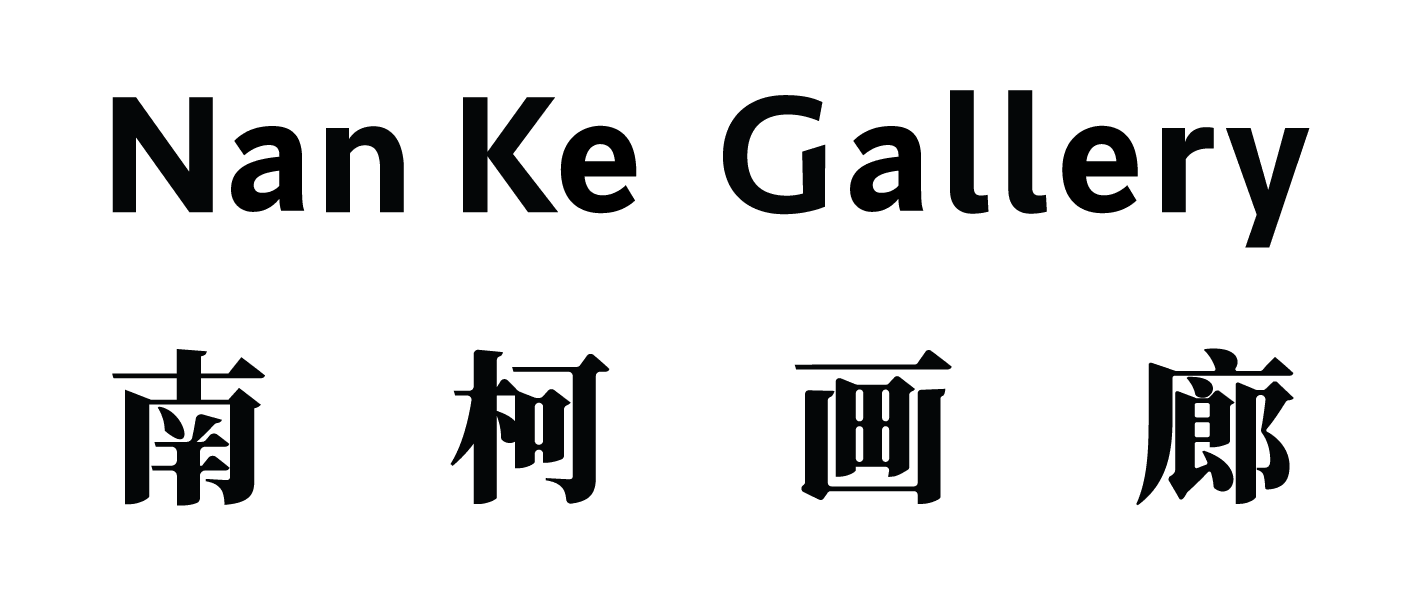

On December 28th, Nan Ke Gallery will present rooted, yet flowing, a dual exhibition by 00 Zhang and Amber Xiangning Lu. In the exhibition, they explore the complex relationship between time, space, memory and identity through their distinct yet echoing artistic languages. Through their works, we are able to enter a realm that is both personal and universal, and perceive how the artists uniquely incorporate their own emotions, memories and experiences into their creations. Throughout the exhibition, theories of psychogeography, such as non-place, heterotopia, and collective memory provide important perspectives for understanding their work and this exhibition.
00 Zhang's practice spans installations, games and immersive interactive experiences, exploring the duality of the real and virtual worlds, as well as the complexity of personal identity and cultural conflict in a multicultural environment, while Amber Lu explores the multidimensionality of space and the deeper significance of personal histories through the innovative use of traditional materials and the use of perception and memory as a tool and medium. The works of the two artists, though different in material and expression, effectively co-construct a dialogue across virtual and reality, memory and the present, across time and space.
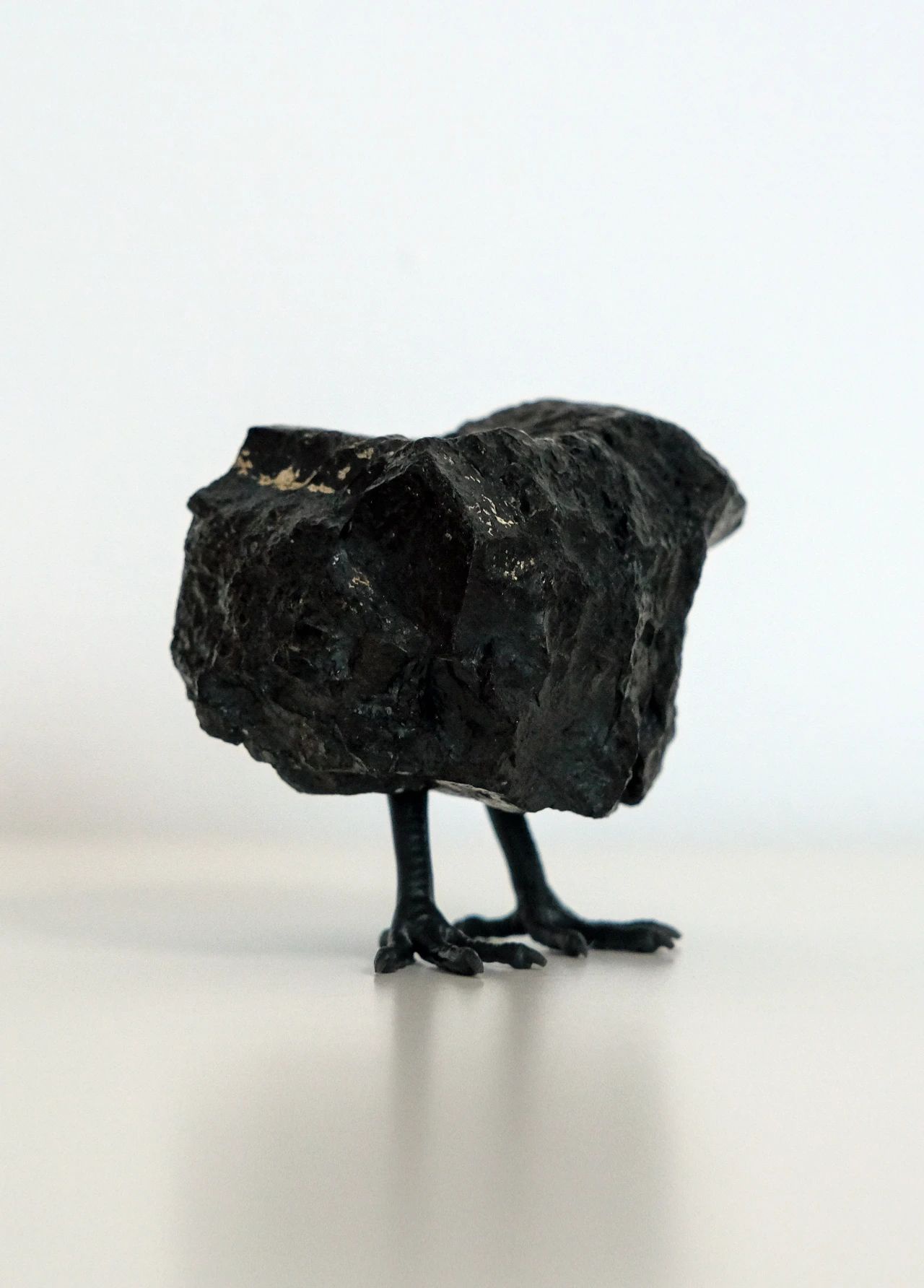
Amber Xiangning Lu
Sometimes Dreams Are as Black as Death, 2024
Jet, 3D-printed Resin
10h x 10w x 10d cm(L)
8h x 7w x 8d cm(M)
5h x 5w x 5d cm(S)
© Courtesy of the artist
'Memory is like a garden where forgotten things grow'
Amber Xiangning Lu's work is a poetic exploration of psychological space, in which she intertwines personal memory with physical space to create dream-like fields. In They Remained Unseen (2024), a transparent sewing machine installation and a book of feathers printed with poems create a surreal atmosphere. The flapping rhythm of birds' wings resembles the turning sound of a sewing machine, echoing through the space. This plausible sound evokes vague memories of family, labour and childhood, which Lu has said stemmed from her regurgitation of subtle emotions in childhood memories - memories that are both familiar and unfamiliar, like emotional maps in psychogeography. 00 Zhang, on the other hand, uses digital technology and futuristic game aesthetics to transport the viewer into a cyber space where reality and reality are intertwined. Her Overture of Prototype Series (2023) is an interactive virtual game in which the player travels between the East London landscape and a utopian world, experiencing a spatial experience that is both real and unreal, a creation 00 Zhang describes as ‘world-building in the form of a self-portrait’. For the artist, this virtual environment is not only a reflection of the outside world, but also a way of capturing her internal state of mind - a kind of self-navigation in the midst of conflicting cultural identities.
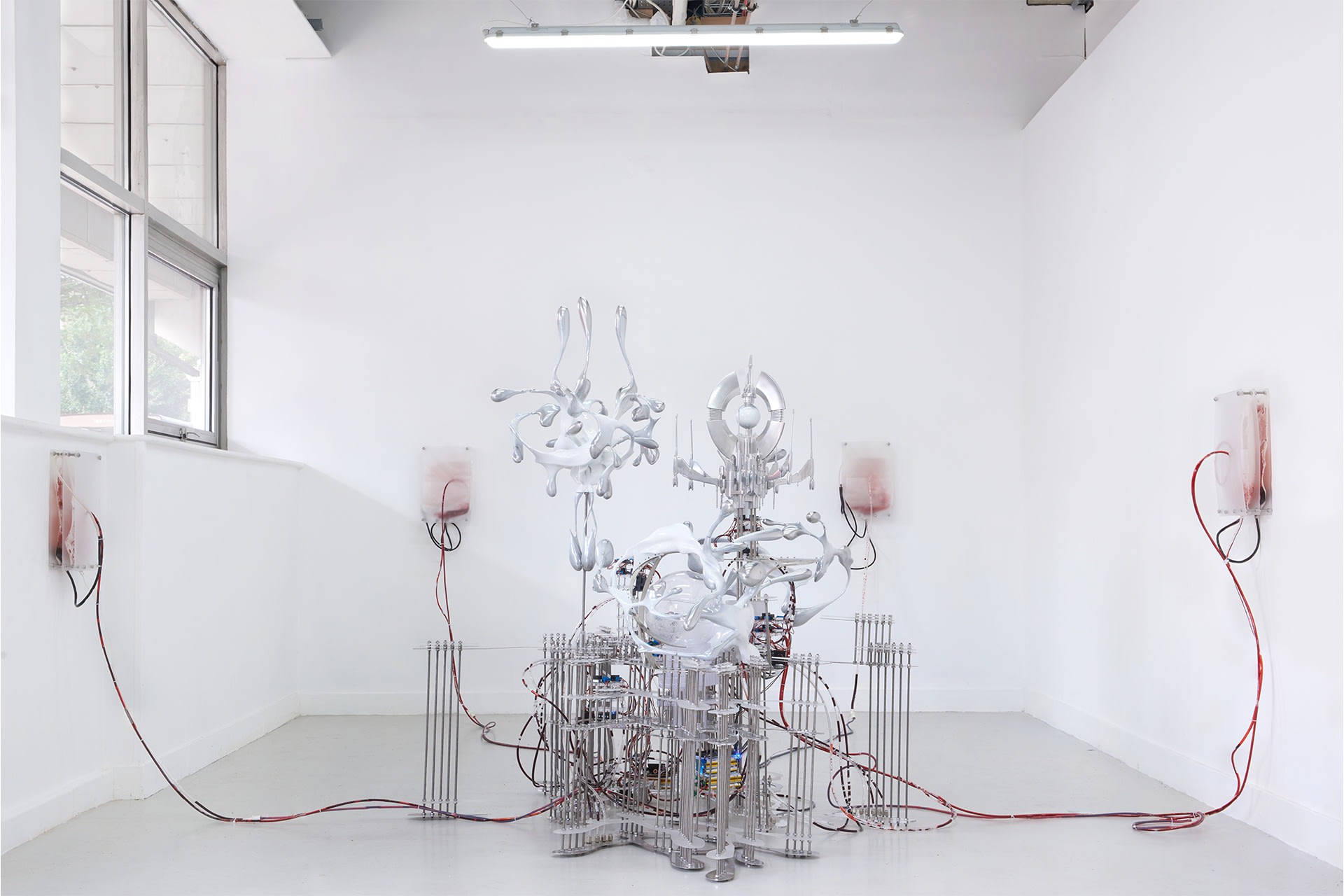
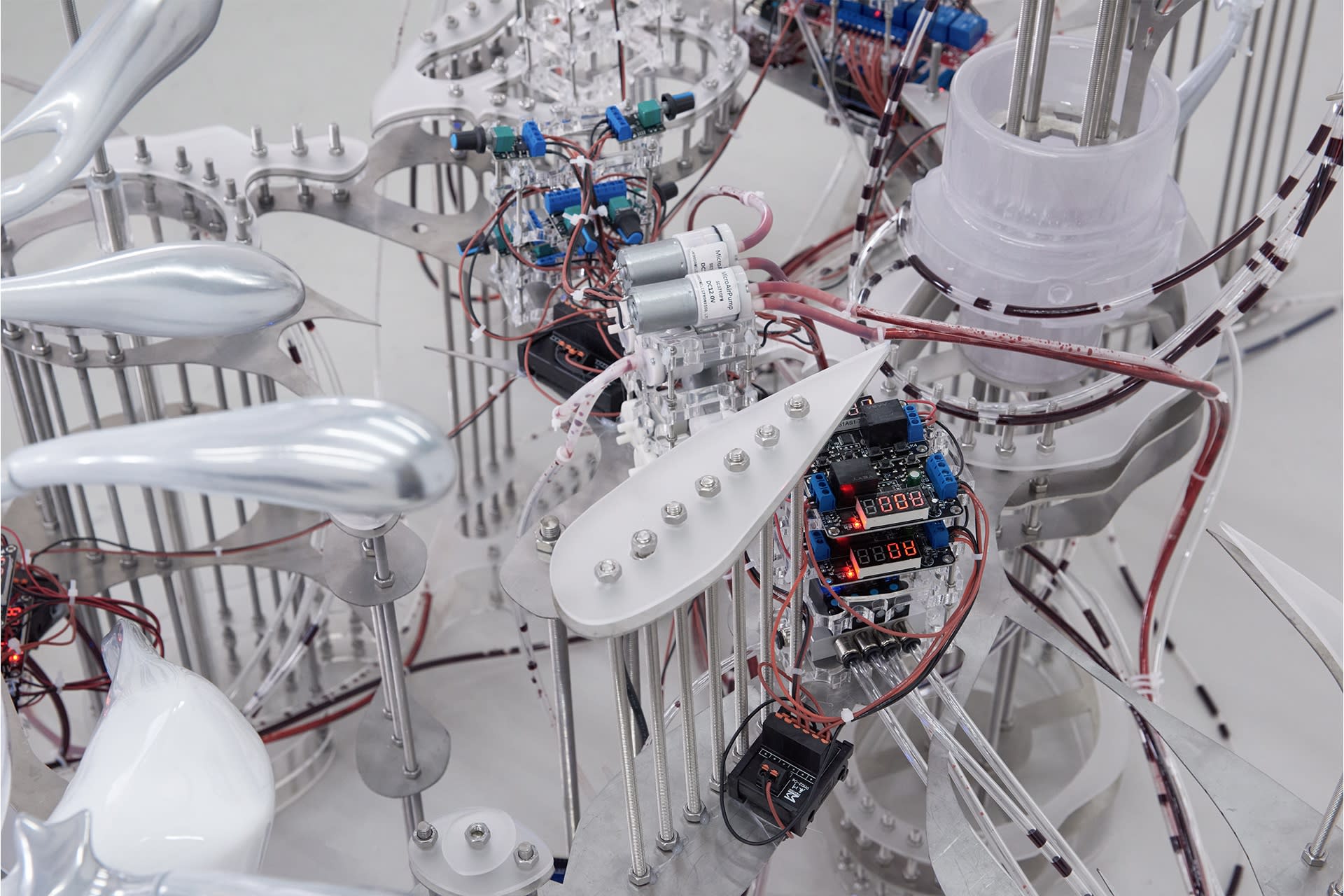
00 Zhang
Inversion Prototype 0033, 2024
304 stainless steel, 316 stainless steel, silver coated resin
187h x 163w x 134d cm
© Courtesy of the artist
'The past is never dead. It’s not even past'
Both Amber Xiangning Lu and 00 Zhang create a ‘third space’ between the real and the virtual in their works. This kind of space can be regarded as Marc Auger's ‘non-place’ or Michel Foucault's ‘heterotopia’, Lu builds a time-stagnant field through old wooden drawers and camphorised wax layers in Store at Room Temperature (2024) and The Night Before (2024). These relic drawers not only carry personal memories, but also symbolise a collective nostalgia, Lu talks about how the landscapes depicted in the paintings before a sandstorm seem to be the past seen through the drawers as a storage medium, which is both a part of the individual's history, but also a window for the viewer to enter into a dream-like heterotopia. The flocks of stone birds in Sometimes Dreams are as Black as Death (2024) are a metaphor for childhood stress and anxiety; birds are light but stones are flightless, like one’s heavy and inescapable past. Indirectly, all Lu’s elements construct a space in which the inside and outside, the everyday and the unusual gradually merge, forming a surreal and uncanny environment. 00 Zhang, on the other hand, through her new series of works Prototype 0037 (2024), presents a complex space that straddles mechanisation and organism. Prototype 0037 Disk Array (2024) resembles a futuristic paleontology - an embryonic slice that presents in the form of medical imaging of organic life; Prototype 0037 ISO-9960 (2024) translates a mechanised dynamics of the artist herself, conveying a state of metamorphosis in the breathing rhythmic changes of light and dark;and in the hospital bed, Prototype 0037 RAID 0 (2024) presents the completed form of this‘life’ throughout this series; In the space constructed by the Prototype 0037 (2024) series, the flow of energy is intertwined with the intuitive expression of the artist's memory, forming a profound reflection on the process and state of life.
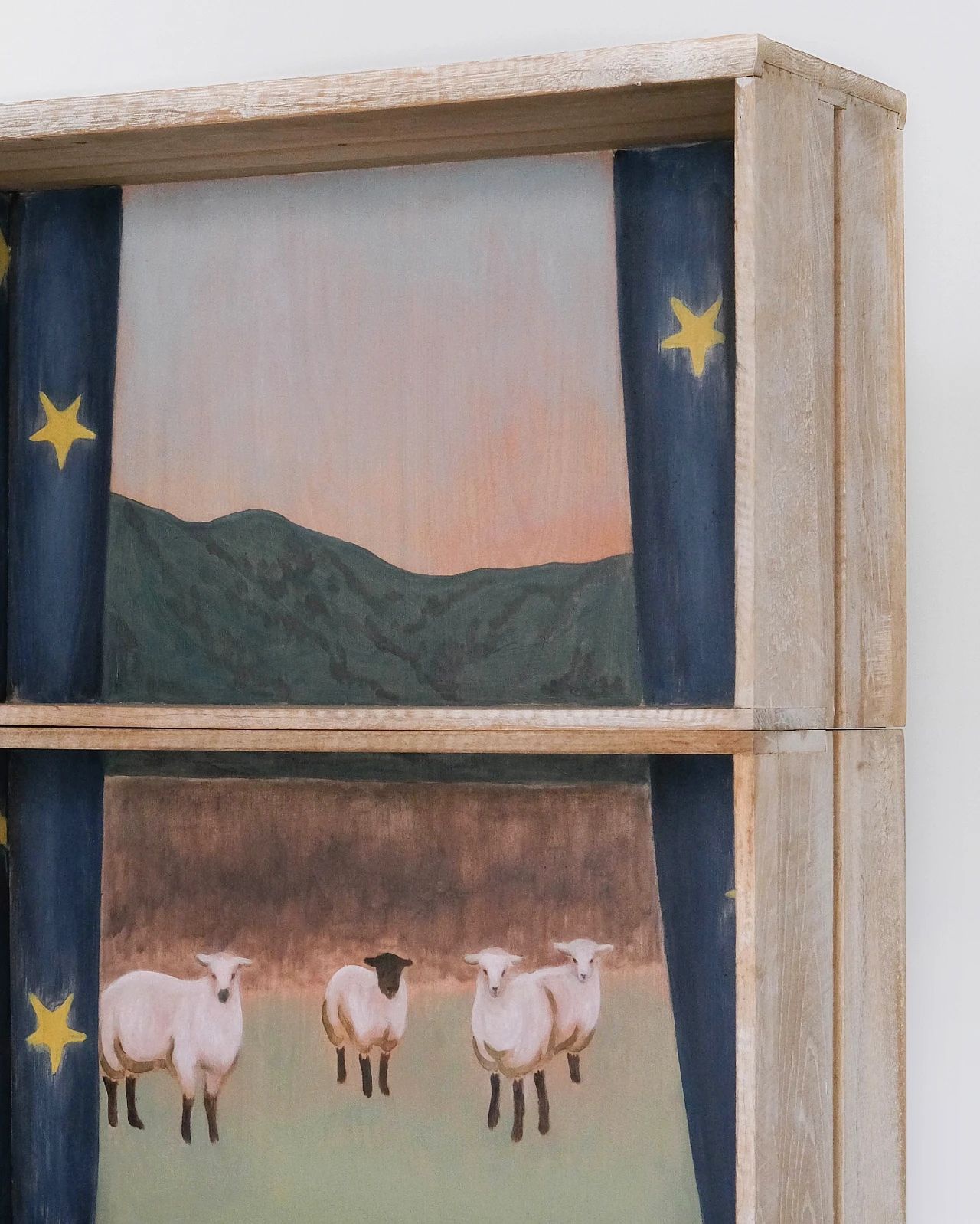
Amber Xiangning Lu
The Night Before, 2024 (局部)
Reclaimed wood, oil and acrylic on panel, camphor, wax finish, acrylic
113h x 66w x 26d cm (含底座)
© Courtesy of the artist
'The future is already here – it’s just not evenly distributed. '
00 Zhang weaves her cultural background and international living experience into her work through a futuristic artistic language. Her large-scale installation Reverse Prototype 0033 (2024) presents a complex cycle of mechanised, organism-like sculptures. In this immense and sophisticated work, a liquid simulating blood flows between various parts, symbolising the transfer of the individual and life force between virtual and real space, and the boundary between individuals and greater systems. It not only explores the role of the individual as a part of the system, but also reflects on migration, population movement, and the fluidity and borderlessness of cultures. 00 Zhang admits that this work, which took nearly a year to create, is not only captures her personal state at various times, but also a response to the conflict of cultural identities that she has experienced in the context of globalisation. At the same time, Amber Xiangning Lu reinterprets objects and materials to incorporate her personal history into her works. In Can't Be Taken Along (2024), Lu cleverly intersperses auricles between beaded curtains, putting forward the paradox of memories that are attached to the body but cannot really be taken away. Lu explains that this work is a metaphor for family histories - those that could not be taken with us are what define our sense of belonging.
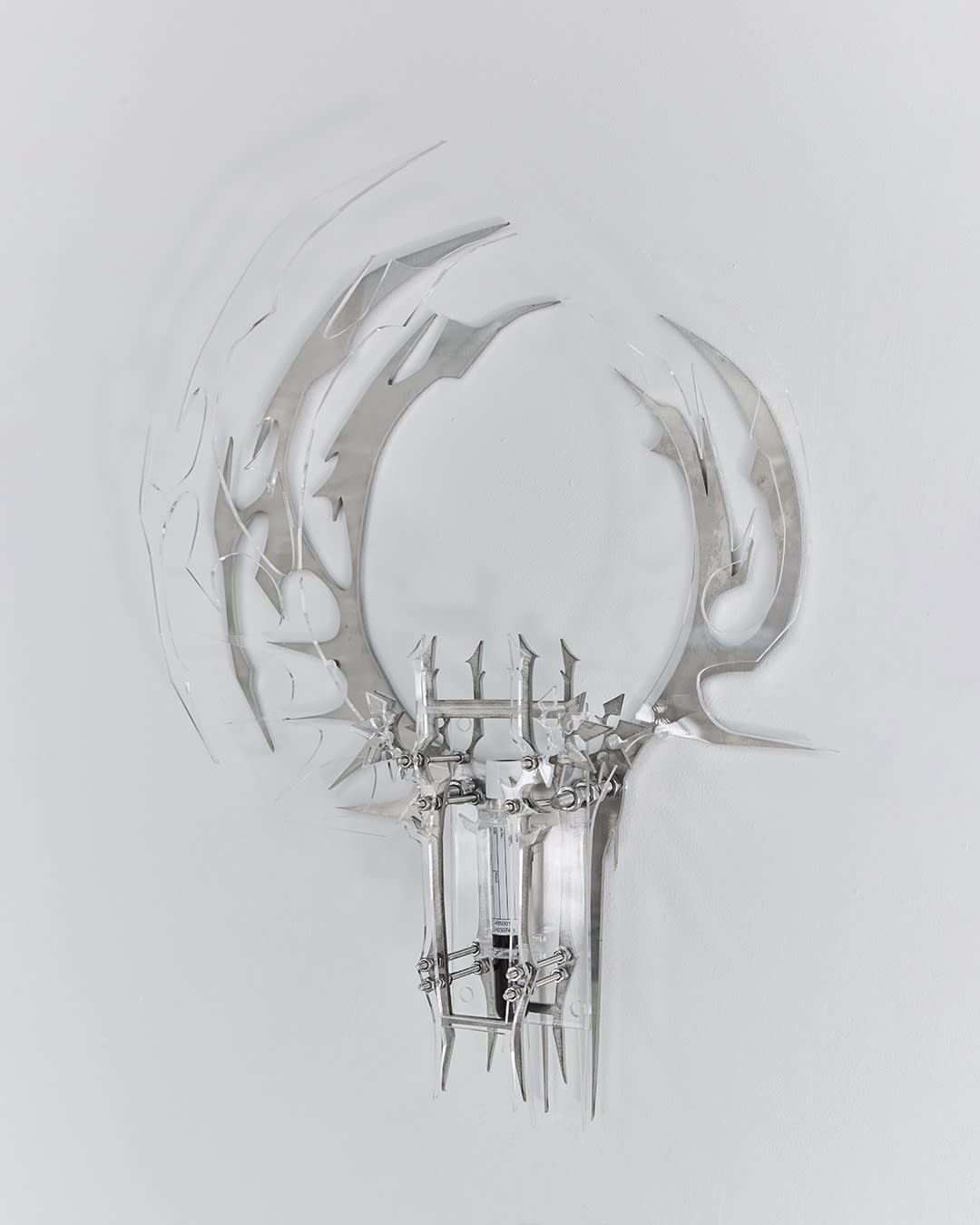
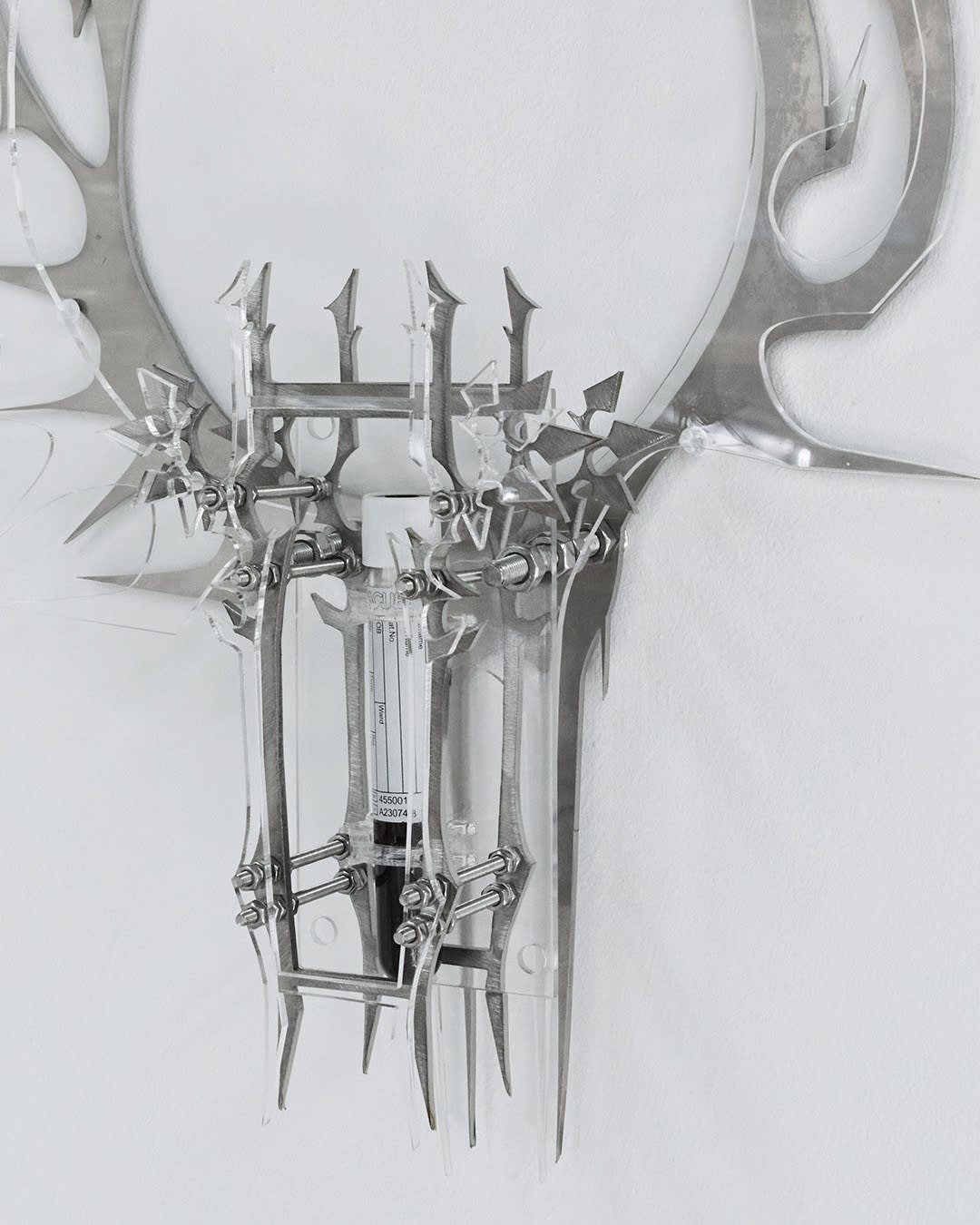
00 Zhang
Inversion Prototype 0033DLC, 2024
316 stainless steel, acrylic, aseptic blood
41h x 36w x10d cm
© Courtesy of the artist
With their unique artistic practices, Amber Lu and 00 Zhang offer us a new way of understanding time, space, memory and identity. What we see in their works is not only a complex narrative intertwined with personal experiences and cultural backgrounds, but also a profound reflection on the possibilities of the future. Psychogeography reminds us that every path and every landscape carries the unique perception of an individual, and perhaps this is the most touching part of Lu and 00 Zhang's works. At a time when everything is evolving at such rapid pace, their artistic practice responds to an important question: how do we redefine ourselves when boundaries become blurred, when reality and the virtual are intertwined? Perhaps the answer lies not in a specific place, but in the mental maps we construct as we travel through these multidimensional spaces and times. These maps not only record our journeys, but also guide us to new territories we may reach in the future.
附录
Memory is like a garden where forgotten things grow. Alejandra Pizarnik
The past is never dead. It’s not even past. William Faulkner
The future is already here – it’s just not evenly distributed. William Gibson
心理地理学:Psychogeography,探讨环境对人类情绪和行为影响的一门跨学科研究。
非场所:Non-place,由Marc Augé提出,用以描述现代社会中缺乏历史感和身份认同的大众化过渡性空间。
异托邦:Heterotopia,由Michel Foucault提出,用来描述那些同时存在于现实之外但又真实可见的“他者”空间。
Text by Yusi
